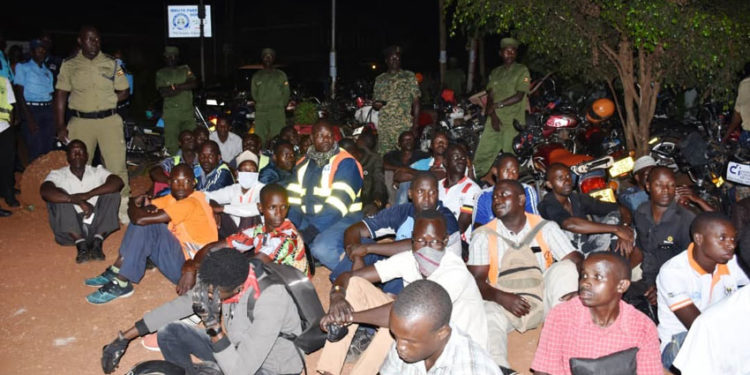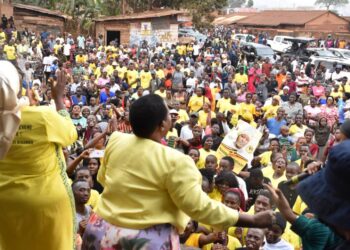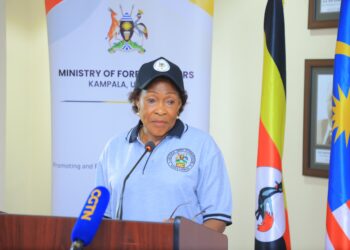President Yoweri Museveni last month,issued the first set of directives as one of government’s strategic move to curb the spread of COVID-19 outbreak.
Some of the directives included banning of religious gatherings and suspension of school activities.
In the following addresses, the President announced a total lockdown by banning public and private transport as well as declaring a curfew.
However, according to a human right report issued on Friday this week, while implementing such directives, the levels of violating human rights have always kept on increasing.
Here are some of the most reported cases of human rights violations during this lockdown period;
1. The emerging vice of stigma and discrimination, according to the Uganda Human Rights Commission (UHRC), there are increasing cases and practices of discrimination and stigmatisation by the general public against suspected victims of Covid-19 and the persons discharged by the Ministry of Health from Hospitals and Institutional quarantine.
2. Domestic violence, since 18th March 2020, there has been an increasing rate of violence in various homes. This has been evidenced by the spikes in domestic violence in various parts of the country. There have been cases of spouses who have been clobbered to death. For example, one Leo Muhairwe of Kituuru LCI, Igwanjuru Parish, Kabwoya Sub-county in Kikuube District was allegedly killed because of selling a family radio to raise money for use during the lockdown. The wife is alleged to have accused him of selling the only radio they had for use to receive covid-19 related messages.
3. Unwarranted attacks on security agents by some civilians. Severally reports have emerged on attacks of security agents while they enforce government directives especially during the curfew time by some people in various communities who have decided to take the law into their own hands contrary to article 17 of the Constitution. For-example the recent attacks on one of the UPDF soldiers in Amuru District that has resulted into loss of one of the soldier’s eyes, the boda-boda cyclists who caused physical injuries to a traffic police officer in defiance of government directives on 17th April 2020 in Mbale District.
4. Use of excessive force by some security officers, although various security agents have done a recommendable work in implementing the president’s directives, there remains a great concern on the continued use of excessive force by some members of the security officers operating outside the aforementioned official government policy thus, leading to violations of the right to freedom from torture and cruel, inhumane and degrading treatment or punishment, right to life and deprivation of the right to personal liberty, specifical detention beyond 48 hours as evidenced by the 128 complaints received by the UHRC during the period under review.
5. The culture of lawlessness, impunity and lack of respect for the rule of law. There is an increasing rate of lawlessness and failure by a cross-section of the population to adhere to the lawful directives issued by the Government generally. This explains the continued arrests by the security agents of the people found holding congregational prayers, those forging stickers to travel at whatever cost, those found defying or in breach of the curfew regulations, the traders who insist on carrying out the usual business.
6. Lack of support to the vulnerable and marginalised groups, According to UHRC, the disadvantaged and marginalised groups have been severely affected by the current crisis. The elderly, People With Disabilities, those with pre-existing health conditions and compromised immune systems such as the HIV/AIDs patients and pregnant women, are particularly vulnerable to the serious health consequences of COVID-19 and the lockdown.
7. Access to justice in criminal matters through courts of law: The Commission notes that the judicial processes have also been affected by the coronavirus pandemic. The Commission particularly notes that the court sessions have been reduced, with only the Chief Magistrates countrywide working in the magisterial areas on selected days identified by key stakeholders.
8. Displacement of people due to evictions, and effects of landslides, despite the current situations some dangerous people have continued to be evicted people from their land despite the government ban on evictions during the lockdown period, for example, the eviction that took place in Luwero District recently.
9. Access to justice in criminal matters through courts of law has also been affected. As a result of this many suspects have to wait in police custody for days before the magistrates can attend to their matters, and this results into congestion in police cells which can increase risks of acquiring the disease.
Do you have a story in your community or an opinion to share with us: Email us at editorial@watchdoguganda.com












